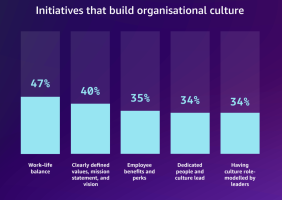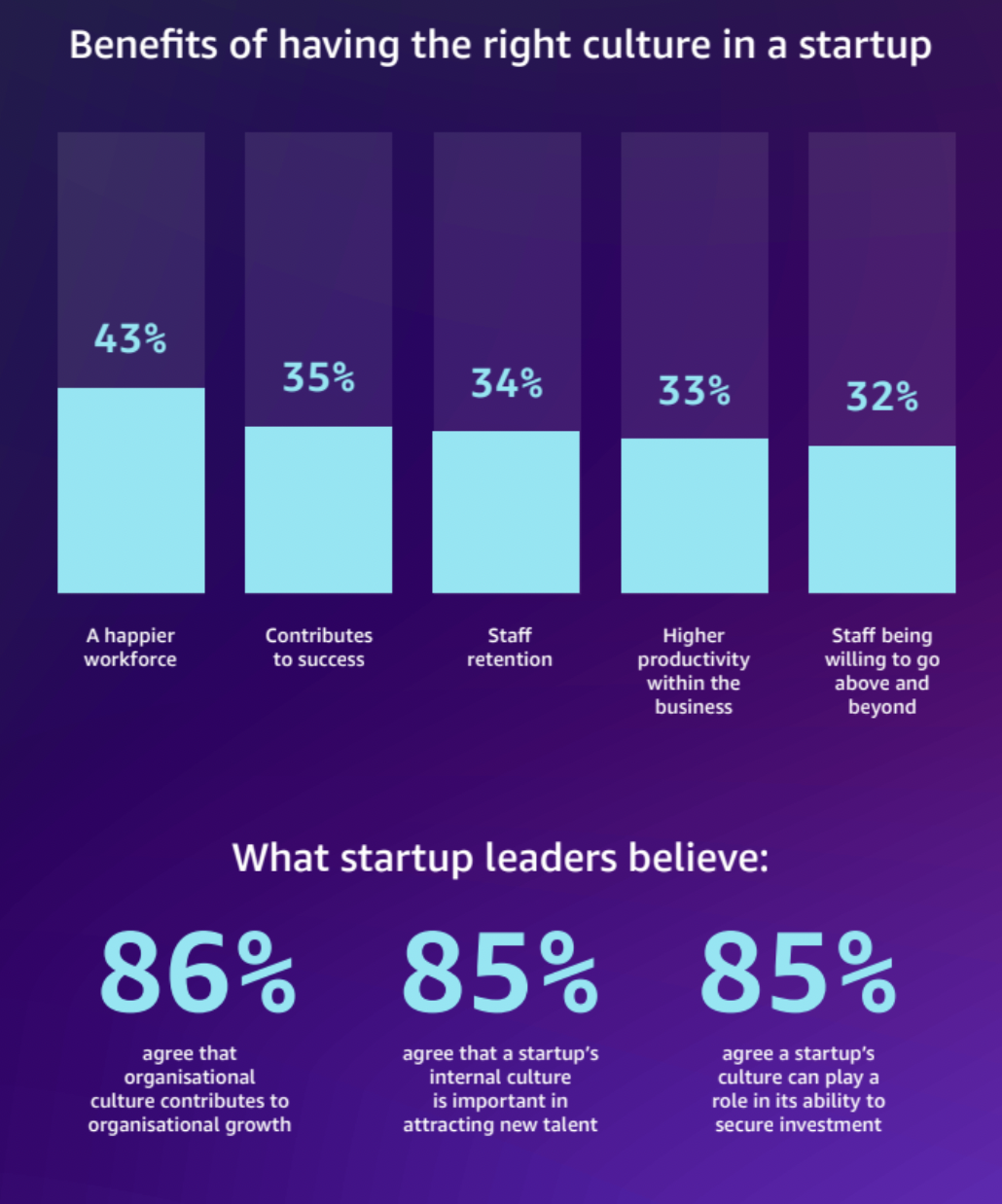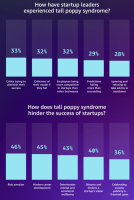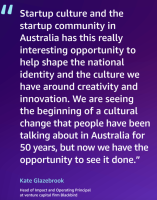“Culture” is bandied about a lot in business, but what does it mean, and why is it crucial for startup founders?
When you hear someone say ‘startup culture,’ what comes to mind? Happy hours, pets in offices, ping pong tables, basketball hoops, zen rooms, unlimited paid time offs (PTOs), a big happy family?
While those perks do cheer up employees, increase comfort and spark creativity, more is needed for a thriving business.
Amazon Web Services (AWS) recently released a 30-page report highlighting good work culture’s importance to building a successful startup.
AWS surveyed 500+ Australian startup leaders online and weighted the data to the latest Australian Bureau of Statistics population estimates.
Head of startups for AWS ANZ, John Kearney, said culture depends on what its founders stand for. It’s not just about attracting top talent but also paving the way for future success.
How a company treats its employees directly reflects how it will treat its customers.
To build a thriving company culture, you need well-defined values, mission statements, vision, and of course, work-life balance. These are the building blocks for a kick-ass company culture that fosters growth and achievement.
However, data shows that values have little worth unless they’re role modelled by founders; leaders must lead by example.
For instance, if transparency is a core value, founders should be open to receiving feedback on their performance, both positive and negative.

Startups have unique cultures, but the best ones share some important traits:
- Convincing storytelling: Founders need to be great storytellers who can sell their idea and their ability to bring them to life.
- Willingness to experiment: Startups encourage testing ideas and viewing negative outcomes as learning experiences.
- Quick decision-making: People in startups often have to make decisions quickly, sometimes without complete data.
- Adaptability: Startups often change their business model several times before finding success, so flexibility is essential.
- Transparency: Workers in startups place their trust in the company’s founders, and transparency is important for earning that trust.
- Resourcefulness: Startup founders have limited time, skills, and money, so innovative thinking is essential for breaking through barriers quickly and cost-effectively.
Why culture is integral for success
Startups with tight budgets can be chaotic and stressful, so salaries aren’t always competitive. But here’s the deal: founders need badass teams to make it.
That’s why a strong company culture is key to hiring and retaining top talent. When employees feel invested in the company’s vision and mission, whether emotional or financial, they’re more likely to stick around. So, culture matters, people!
Of the 509 startup leaders surveyed, 80% agree that a strong culture is essential for growth, talent acquisition, and customer and investor attraction.
Interviews with various founders, investors, advisors, and influencers in the startup ecosystem have also confirmed the crucial role of culture in achieving success.

The best startups have a culture that transforms great ideas into successful outcomes faster than traditional organisations and ensures that startups are exciting workplaces.
How to set the right culture
To make your startup rock, founders need to implement some key cultural attributes:
- Freedom from fear: This is a critical characteristic of startup culture. Treating mistakes as learning moments is the difference between startups and traditional organizations. Mistakes are opportunities to learn and grow; founders must create an environment encouraging risk-taking and innovation.
- Building trust through transparency: Strong teams are built on trust, and founders can gain trust by being open and honest about the business’s performance.
- Alignment to mission: Early team members should share the founder’s passion for solving a problem or creating a service.
- Benefits of benefits: Non-financial benefits such as training, flexible working, and support for personal interests help attract and retain employees.
- Culture of ownership: Staff should have a shared mission and values and be able to make suggestions to improve the startup’s development.
- Building diversity: Hiring people with diverse backgrounds and perspectives helps avoid a monoculture and brings fresh ideas and opportunities to the table.
Pressures to fight
Startup teams create the cool stuff, but that doesn’t mean they’re invincible to the stresses of running a business.
To keep on top, founders need to take care of themselves too, and have some solid coping strategies in their back pockets.
Startups are particularly at risk of overwork and burnout because of the pressure to grow fast, and sometimes founders feel like they’re faking it till they make it. Plus, even when they make it, haters are always waiting to rain on their parade.
The AWS report reveals that founders and their teams are feeling the heat in three major ways:
1. Grind Culture
Leaders often talk about feeling constant pressure and working long hours, especially among younger founders. It can be tough for founders to set a good example when it comes to work-life balance, and many admit they struggle with it.
“As a founder, you don’t want to be a hypocrite, but it can be hard,” says Dr Ben Hurst of HotDoc.
“The first couple of years did require us going above and beyond, just because the learning curve was so steep. Now we have a cultural norm of ‘look after yourself.’ You are doing the wrong thing if you are working in a way that is not self-sustaining.”

2. Tall poppy syndrome
The report found that two-thirds of startup leaders think the ‘tall poppy syndrome’ is still a big issue in the community, with social media being a major source of criticism.
This can lead to risk aversion, slow career growth, and mental health problems. A whopping 97% of founders who’ve dealt with this syndrome believe it harms a startup’s success.
Barb Hyman, CEO of Sapia.ai, advises that the way to handle the haters is “to keep pushing forward”.
3. Imposter syndrome
Running a startup can be a founder’s first rodeo leading a team and growing a business at warp speed. So it’s no wonder many feel like frauds, especially the younger ones.
But they can manage these emotions by developing personal resilience, celebrating small victories, and being kind to themselves.
However, some admit to pushing themselves until they hit rock bottom, and 19% need extra help to manage their feelings.
HotDoc’s Ben Hurst copes by talking to his team about it and not setting unrealistic expectations for himself. Knowing and avoiding these traps can help founders manage them better, and creating a strong and transparent culture can help them stay resilient.
Shared experience
Fortunately, the Australian startup community offers support through networking events, shared learning sessions, and a willingness to come together around common challenges.
Unfortunately, almost a quarter of startup leaders don’t know about this support, especially younger respondents in the report.
This highlights the need for more investment in providing founders with adequate support, especially for less experienced or connected people.
Glassdoor’s 2019 survey found that 4 out of 5 job seekers consider a company’s mission and culture before applying. This is especially important for 18 to 35-year-olds, with 65% prioritizing culture over salary.
In TINYpulse’s 2019 Employee Engagement Report, 43% of 25,000 employees across 20 industries said they would leave their companies for a slightly better offer due to weak company culture.

Successful startup cultures share commonalities with long-lasting empires throughout history.
Just as the Roman Empire was known for its strong military and efficient administration, successful startups must have a solid foundation and effective management structure.
The British Empire’s emphasis on exploration and trade can be compared to the need for startups to innovate and find new markets constantly.
Likewise, the Mughal Empire’s cultural and religious tolerance mirrors the importance of diversity and inclusivity in modern startup cultures.
Overall, the parallels between the quality of a long-lasting empire and a good culture for a successful startup highlight the importance of having a clear vision, strong leadership, a solid organisational structure, a culture of innovation and adaptability, and a set of values that guide actions and behaviours.
By focusing on these key areas, startups can establish a strong foundation that will help them achieve long-term success.




















Trending
Daily startup news and insights, delivered to your inbox.